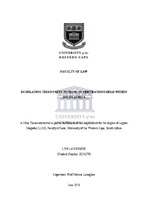| dc.contributor.advisor | Lenaghan, Patricia | |
| dc.contributor.author | Lawrence, Lyn | |
| dc.date.accessioned | 2018-09-18T10:14:46Z | |
| dc.date.available | 2018-12-31T22:10:06Z | |
| dc.date.issued | 2018 | |
| dc.identifier.uri | http://hdl.handle.net/11394/6408 | |
| dc.description | Magister Legum - LLM (Mercantile and Labour Law) | |
| dc.description.abstract | The decision by countries to relax the common law doctrines of maintenance and champerty
to accommodate Third Party Funding (TPF) in dispute resolution has sparked a worldwide
debate. The controversial practice of funding disputes in exchange for a share of a successful
outcome or settlement has left courts and administering institutions in a compromising
position. South Africa joined the debate in 2004 after the Supreme Court of Appeal (SCA)
relaxed the application of the doctrines in favour of TPF.
The SCA found that domestic courts have the necessary mechanisms to protect themselves
against any repercussions of TPF without the assistance of the doctrines. The SCA limited
their search to the abilities of the courts and did not consider the effect TPF could have on other
dispute resolution processes such as arbitration. This study seeks to discover whether
arbitration can protect itself against the repercussions of TPF. It further questions the possibility
of adopting regulations to aid in the protection of arbitration should the current mechanisms be
insufficient. | |
| dc.language.iso | en | |
| dc.publisher | University of the Western Cape | |
| dc.subject | Arbitration, Claimholder, Funding Agreement, Funder, Hong Kong, Regulate, Respondent, South Africa, Third Party Funding, United Kingdom | |
| dc.title | Regulating third party funding in arbitrations help within South Africa | |
| dc.rights.holder | University of the Western Cape | |

